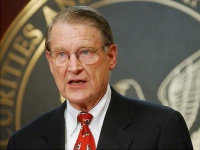William Webster
William H. Webster is an American attorney and former federal judge. In 2002, he became Chairman of the Homeland Security Advisory Council (HSAC).[1]
Contents
Background
Webster attended Amherst College, possibly at the same time as fellow DCIA Stansfield Turner.
Career
FBI and CIA
In 1978, President Jimmy Carter appointed Judge Webster Director of the Federal Bureau of Investigation (FBI) in the wake of the investigations of the FBI in the mid-1970s.[2] Webster remained FBI Director until 1987, when as the Iran-Contra investigations were ongoing and the CIA was facing new and intense pressures, President Ronald Reagan appointed him Director of Central Intelligence (CIA). William Webster is the only person to have successively held the position of Director of both FBI and CIA.[3]
Private practice
In 1991 William Webster returned to private practice as a senior partner in the law offices of Milbank, Tweed, Hadley & McCloy in Washington, DC., where until 2005 he specialised in arbitration, mediation and internal investigation. He is a director of the American Arbitration Association and the advisory board of the CPR Institute for Dispute Resolution and the corporate consultancy Diligence. He is also a trustee of Washington University in St. Louis.
Russian business
E. P. Heidner refers to William Webster as a "key member" of "Diligence and its sister company New Bridge... demonstrat[ing] the Western political and financial muscle working with the Yeltsin family".[4]
Chair of HSAC
In 2006 Webster was appointed as the Chairman of the Homeland Security Advisory Council. Webster's business interests undermined his credibility to serve in position supposedly crucial to restoring faith in integrity of the US's financial system. Webster was on the board of U.S. Technologies Inc., (UST) a once high-flying Washington firm, which "ceased to exist as a publicly traded company when its stock was de-registered, four months after chief executive C. Gregory Earls was convicted of defrauding investors of $13.8 million." UST used prison labour to manufacture its products and according to the Washington Post "William H. Webster was chosen to head the federal accounting board panel created in the wake of the scandals at Enron Corp. and WorldCom Inc. Following news reports that U.S. Technologies had been sued for fraud by investors, Webster withdrew his name from consideration. The brouhaha helped prompt the resignation of Webster's sponsor, Harvey L. Pitt, who was chairman of the Securities and Exchange Commission at the time."[5]
According to Nathan Newman, a union lawyer and vice president of the NYC National Lawyers' Guild:
Webster also managed to get appointment in the early 1990s to the three-member government panel overseeing corruption in the Teamsters. Yet despite being paid $100,000 per year for the job, paid out of hardworking Teamsters' dues, many union officials have argued that Webster has been doing very little to earn his money. In serving on the board, Webster has clear conflicts of interest, since he serves on the corporate board of Anheuser-Busch, which negotiates contracts with the Teamsters. As well, Webster serves on the board of Pinkerton Security and Investigations Services, notorious in labor history for its strikebreaking. Unions and affiliated groups like the Labor Party have passed resolutions condemning the Teamster review board for allowing Webster to serve in such a position.[6]
References
- ↑ "Chairman, Homeland Security Advisory"
- ↑ "Interview with William H. Webster", 2005, The Miller Center
- ↑ "Directors of Central Intelligence as Leaders of the U.S. Intelligence Community"
- ↑ Document:Collateral_Damage_911
- ↑ Brooke A. Masters, "U.S. Technologies Stock Delisted After Fraud", Washington Post, 27 August 2004
- ↑ Nathan Newman, "Fire 'Judge Webster' — and Then His Boss", NathanNewman.org, 1 December 2002
